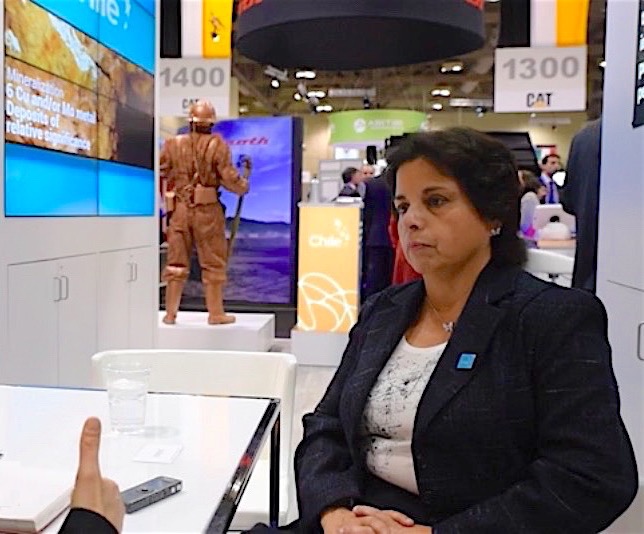Chile steps up efforts to lure mining investors beyond copper sector
Chile, the world's No. 1 copper producer, is seeking to attract more investors to its mining sector beyond the well-established copper industry, in an effort to diversify the red metal-depending economy and take advantage of a soaring demand for green energy-related resources such as lithium.
As part of the nation's recent efforts, the state mining company ENAMI presented in Canada almost a dozen new greenfield (located in in previously unexplored areas) and brownfield exploration projects (near or adjacent to an already operating mine or known deposit) in different stages of development, for which Chile needs strategic partners that can help it take them closer to production.
Newly developed National Registry of Mining Concessions shows that 61% of Chile's territory is not only resources-rich, but also potentially available to mining concessions.Speaking to MINING.com on the sidelines of the Prospectors and Developers Association of Canada (PDAC) conference, held in Toronto earlier this month, mining minister Aurora Williams, said one of Chile' main goals is to bring foreign capitals to the Maricunga and Pedernales salt flats, located in the northern region of Atacama, property of state-owned copper giant Codelco.
The government has also developed a National Registry of Mining Concessions that integrates geophysical and geochemical data, and which shows that 61% of Chile's territory is not only resources-rich, but also potentially available to licensing.
Here's what Williams had to say:
MINING.com: Now that copper prices have rebounded, would Codelco resume or speed up projects that were placed in the back burner about a year ago?
AW: Despite an unexpected rebound in copper prices late last year, Codelco is sticking to its reduced $18 billion capital spending program through 2020 to expand its aging copper mines, down from an initial $25 billion when prices first slid.
While current market conditions allow us to forecast a pick-up in prices, what really matters is the more permanent market conditions, which can sustain the upward trend.
For now, Codelco's production is forecast to remain the same, increasing by 2023.
MINING.com: As you are well aware, The Fraser Institute's latest annual global survey of mining executives, who rank the world's more attractive mining jurisdictions, showed that Chile plummeted by 28 places. Why do you think foreign investors are thinking less of Chile? What issues are they encountering nowadays that they didn't face before?


Chile's mining minister Aurora Williams says BHP and its Escondida mine workers should resolve their issues through negotiation. (Image: MINING.com at PDAC 2017.)
AW: The ranking, as you point out, is based on perceptions and the drop only pushes us, the government, to do a better job in communicating what we are doing and the opportunities Chile offers to mining investors.
For example, we implemented a tax reform last year, which didn't have any kind of negative effects in the mining sector as some feared. We even took into account the status of new projects in the pipeline and were are giving companies enough time to slowly adjust to the new measures.
Chile is a country that offers investors stable market conditions.
MINING.com: However, the country has been recently impacted by the strike at BHP's Escondida mine. Total production dropped by 12% in February due to the strike alone. How long do you think it will last and how it'll impact both Chile's GDP and its expected annual production?
AW: We estimate that some 3,400 tonnes of copper are not being produced each day of the strike. This translates into 100,000 tonnes per month. Since the strike is about to reach the 30-day mark, we have already lost some 100,000 tonnes of copper, and the situation worsens as it goes on.
MINING.com: Can't the government intervene?
AW: The only thing we can do is to offer the parties in conflict a space for dialogue through our labour division. Collective bargaining and the right to strike are guaranteed by the country's constitution. The idea would be for them to look for solutions that benefit both sides equally.
Other than copper, Chile's is increasingly becoming a leader in lithium. Currently, the nation is the world's second-largest producer of the white metal, which has become an irreplaceable component of rechargeable batteries used in high tech devices.
The country holds half of the world's most "economically extractable" reserves of the metal, according to the US Geographical Survey (USGS). It is also the world's lowest-cost producer, thanks to an efficient process that makes the most of the country's climate.
Demand for the commodity, frequently referred to as "white petroleum," especially for its use in nuclear fusion reactors, high capacity electric-car batteries and aluminum and lithium alloys, is expected to rise in the coming years, the Chilean government says.
Watch a summary of MINING.com interview with Chilean Mining Minister Aurora Williams here: